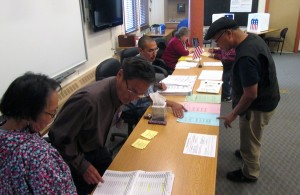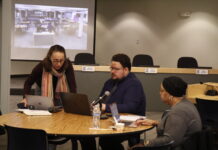Attorneys have responded to the State of Alaska’s proposed plan to address a state Supreme Court order to improve translation of voting materials in Native languages before November 4th Elections.
In a 30-page document, Attorneys with the Native American Rights Fund, representing Yup’ik and Gwich’in Alaska Native voters, asked for five main changes before election day. NARF Attorney Natalie Landreth says the most important request is that the state have bilingual help for Native language voters in every community where it’s needed.

“You have to have a bilingual person in place in each place in each village in advance of the election and on election day, that’s number one. Number two: you have to have written translations in Yup’ik of the ballot measures, the pro and con statements, the neutral summaries and the complicated pre-election information like what early voting is, how to get registered,” said Landreth.
The state has now offered the changes after a decision by federal judge Sharon Gleason that the voter information brochures were inadequate under the Voting Rights Act.
The state’s proposal does not call for one bilingual person to be in each community where voters need help. The state does address additional written translations in their proposed plan.
In the plaintiff’s response brief filed Wednesday, Landreth says the state must address dialect differences and get the word out about services.
“Sometimes there can be one concept that has two different words in different parts of the Delta. We need to ensure that all those written materials are reviewed and adjusted for dialectical differences if there are any. Four, we’re asking for posters. People need to know that this information is available, before election day. They need to be told that all this information is available and be given the name and a place where they can go get this information,” said Landreth.
The state addresses dialects in their proposal but suggests they would only confer with the plaintiff communities of Togiak and Hooper Bay.
Attorneys are also requesting that posters be displayed in election places on election day reminding people in Yup’ik and Gwich’in, of the availability of language assistance, their right to ask for help or to bring someone of their own choosing. The state’s plan includes use of posters.
The state’s plan also includes two teleconference-training sessions. But Attorneys for the plaintiffs say that in-person training for election workers is critical because of all the changes.
“There needs to be an in-person training to show all of these new materials to those pre-election workers and to teach them how to use them,” said Landreth.
It’s estimated that there are between eight and ten thousand limited English proficient Yup’ik language voters and somewhere between 500 and one thousand Gwich’in language voters in Southwest and Interior Alaska.
Judge Gleason is expected to issue an order telling the state what they need to do soon. She has not yet ruled on whether the state intentionally violated voter’s rights on the basis race or color.
Daysha Eaton is a contributor with the Alaska Public Radio Network.
Daysha Eaton holds a B.A. from Evergreen State College, and a M.A. from the University of Southern California. Daysha got her start in radio at Seattle public radio stations, KPLU and KUOW. Before coming to KBBI, she was the News Director at KYUK in Bethel. She has also worked as the Southcentral Reporter for KSKA in Anchorage.
Daysha's work has appeared on NPR's "Morning Edition" and "All Things Considered", PRI's "The World" and "National Native News". She's happy to take assignments, and to get news tips, which are best sent via email.
Daysha became a journalist because she believes in the power of storytelling. Stories connect us and they help us make sense of our world. They shed light on injustice and they comfort us in troubled times. She got into public broadcasting because it seems to fulfill the intention of the 4th Estate and to most effectively apply the freedom of the press granted to us through the Constitution. She feels that public radio has a special way of moving people emotionally through sound, taking them to remote places, introducing them to people they would not otherwise meet and compelling them to think about issues they might ordinarily overlook.




